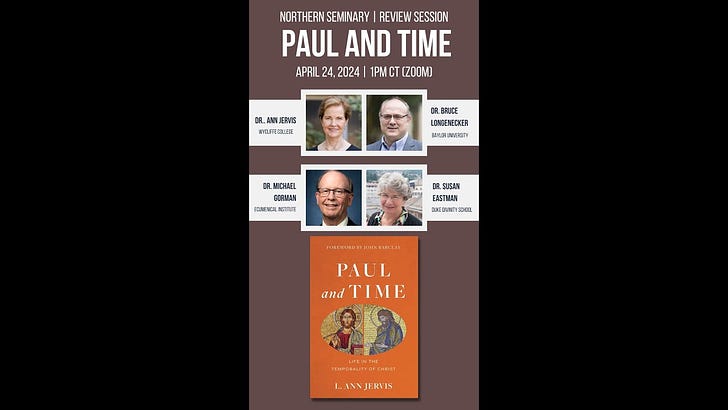Paul and Time (Book Review Session)
Featuring: Ann Jervis, Mike Gorman, Susan Eastman, Bruce Longenecker
What a dream come true to host an online review session of Dr. Ann Jervis’ book Paul and Time, with a very distinguished group of panelists: Dr. Michael Gorman (St Mary’s University), Dr. Susan Eastman (Duke Divinity School), and Dr. Bruce Longenecker (Baylor University).
The video recording of the event is below, below that is the book description of Paul and Time. It is an excellent (and provocative) work that calls into question to “inaugurated eschatology” paradigm that has dominated Pauline studies for more than a generation. The discussion was informative, stimulating, and a model of irenic critical engagement in a context of professionalism and mutual respect.
**This event was generously co-sponsored by Northern Seminary and Baker Academic
Paul and Time: Life in the Temporality of Christ
How did Paul understand time? Standard interpretations are that Paul modified his inherited Jewish apocalyptic sequential two-age temporality. Paul solved the conundrum of Christ's resurrection occurring without the resurrection of the righteous by asserting that the ages are not sequential but rather that they overlap. Believers live in already-not yet temporality.
In this groundbreaking book, Ann Jervis instead proposes that Paul thought not in terms of two ages but in terms of life in this age or life in Christ. Humans apart from Christ live in this age, whereas believers live entirely in the temporality of Christ.
Christ's temporality, like God's, is time in which change occurs--at least between Christ and God and creation. Their temporality is tensed, but the tenses are nonsequential. The past is in their present, as is the future. However, this is not a changeless now but a now in which change occurs (though not in the way that human chronological time perceives change). Those joined to Christ live Christ's temporality while also living chronological time.
In clear writing, Jervis engages both philosophical and traditional biblical understandings of time. Her inquiry is motivated and informed by the long-standing recognition of the centrality of union with Christ for Paul. Jervis points out that union with Christ has significant temporal implications.
Living Christ's time transforms believers' suffering, sinning, and physical dying. While in the present evil age these are instruments purposed for destruction, in Christ they are transformed in service of God's life. Living Christ's time also changes the significance of the eschaton. It is less important to those in Christ than it is for creation, for those joined to the One over whom death has no dominion are already released from bondage to corruption.





Thank you!!!